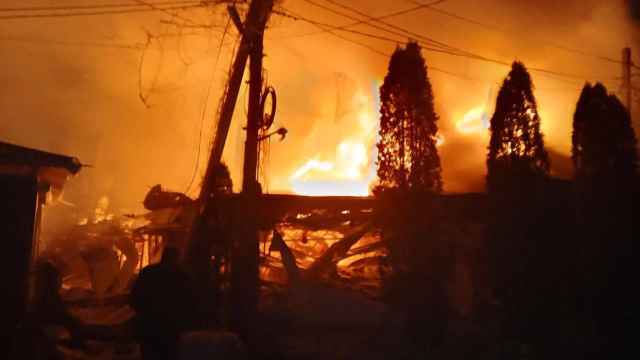The Belarussian ruble, together with the economy as a whole, has crashed. The same fate may await the Russian ruble and economy within five to six years.
The Russian economy today operates in exactly the same way as the Spanish economy of the 17th century, when two-thirds of the country was made up of the aristocracy, state officials, monks and various other social parasites. But Spain’s colonies pumped so much gold and silver into state coffers that there was enough wealth to spread around to keep the Spanish economy above water.
Similarly, in Russia two-thirds of the people don’t work. But the country’s enormous oil and gas helps spread the wealth around.
The only problem is that the constant flow of petrodollars into Russia fuels inflation. In contrast to 17th-century Spain, Russia has two mechanisms enabling it to keep those petrodollars out of circulation: One is capital flight, and the other is the stabilization fund.
According to official Central Bank estimates, $38 billion in capital left the country in 2010. But that figure is heavily understated. The Central Bank defines “capital flight” as money that was initially deposited in rubles or dollars in a Russian account and later transferred abroad.
For example, if Rosneft sells oil at one price domestically and at another price overseas through its intermediary company Gunvor, that is not considered capital flight because no money was lost, only oil.
Clearly, the amount of oil revenues being laundered is much higher than what is being reported. The Central Bank’s figure of $38 billion lost to capital flight and President Dmitry Medvedev’s figure of 1 trillion rubles ($36 billion) embezzled in state contracts do not jibe with each other.
The second way to sterilize extra money is the stabilization fund.
The country’s real budget is now divided between the federal budget and the stabilization fund. The budget is closed to public scrutiny, and nobody has a clear idea how taxpayers’ money is being spent. We only know the figures of the consolidated budget, and we know that expenditures are growing enormously — particularly on state subsidies, social services, the Glonass navigation system, preparations for the Olympic Games in Sochi and defense, where one in every five rubles is embezzled, according to the military’s chief prosecutor.
Only two years ago, the government was able to balance its budget with oil prices at $64 per barrel. A year later, $80 per barrel was required. According to analysts, the 2012 budget will be balanced only if oil reaches $120 per barrel, and this is not even counting the bottomless pit of the pension fund.
So if state expenditures are not covered by the budget itself, the government can always dip into the stabilization fund. This means opening up the money faucet and triggering even more inflation.
Inflation is rising, and the ruble is gaining strength. But in four to five years, those unearned petrodollars that are flooding — and sinking — the economy thanks to runaway corruption will lead to the ruble’s collapse.
Under Prime Minister Vladimir Putin’s model, it is impossible to stop the corruption, and its negative effects can only be mitigated through capital flight. This could easily result in a revolution or, at the very least, serious social unrest.
Yulia Latynina hosts a political talk show on Ekho Moskvy radio.
A Message from The Moscow Times:
Dear readers,
We are facing unprecedented challenges. Russia's Prosecutor General's Office has designated The Moscow Times as an "undesirable" organization, criminalizing our work and putting our staff at risk of prosecution. This follows our earlier unjust labeling as a "foreign agent."
These actions are direct attempts to silence independent journalism in Russia. The authorities claim our work "discredits the decisions of the Russian leadership." We see things differently: we strive to provide accurate, unbiased reporting on Russia.
We, the journalists of The Moscow Times, refuse to be silenced. But to continue our work, we need your help.
Your support, no matter how small, makes a world of difference. If you can, please support us monthly starting from just $2. It's quick to set up, and every contribution makes a significant impact.
By supporting The Moscow Times, you're defending open, independent journalism in the face of repression. Thank you for standing with us.
Remind me later.





